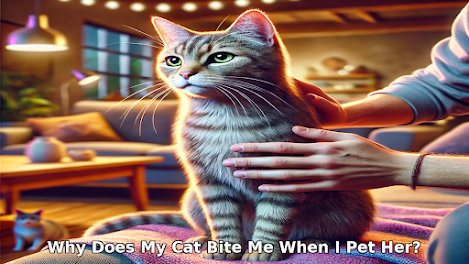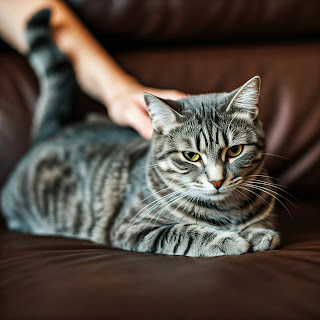Why Does My Cat Bite Me When I Pet Her? Understanding Your Feline Friend's Behavior
Cats are often seen as independent and mysterious creatures, and their behaviors can sometimes leave us puzzled. One common question among cat owners is, “Why does my cat bite me when I pet her?” If you've experienced this mix of affection and sudden nips, you're not alone! Let’s unravel the mystery behind this quirky feline behavior.
1. Overstimulation: A Sensory Overload
Cats have a threshold for physical touch, and petting can sometimes overwhelm their senses. While stroking your cat might seem soothing, repetitive touches can lead to overstimulation. Imagine having your shoulder rubbed for hours—it might feel good at first, but eventually, it becomes too much!
How to spot it: Look for warning signs like tail flicking, flattened ears, or a twitching back. These signals mean it’s time to give your cat a break.
2. Communication Through Love Bites
Cats communicate in their own unique ways. A gentle bite could be their way of saying, “I like this, but I need you to slow down.” These “love bites” aren’t meant to harm but to express boundaries.
What to do: Respect the bite as a sign of affection with limits. Adjust the intensity or duration of your petting to match their comfort.
3. Sensitive Spots: Not Every Touch Is Welcome
Every cat has its own preferences for where they like to be petted. While many enjoy a chin scratch or head rub, areas like the belly, tail, or paws might be off-limits.
Solution: Pay attention to your cat’s reactions. Stick to their favorite spots and avoid areas that make them uncomfortable.
4. Play Aggression: A Leftover Instinct
Cats are natural hunters, and their playful biting is a remnant of this instinct. If your kitty suddenly bites mid-petting, it might be trying to initiate a play session!
Pro tip: Distract your cat with toys to channel that playful energy away from your hands.
5. Pain or Discomfort: A Silent Cry for Help
Sometimes, biting can be a sign of underlying health issues. If your cat bites when you touch certain areas, it might be experiencing pain or discomfort.
What to do: Schedule a vet check-up to rule out injuries or medical problems.
6. Stress or Anxiety: Cats Feel It Too
Changes in the environment, new pets, or loud noises can make cats anxious. This stress can lead to unpredictable behavior, including biting.
Solution: Create a calming environment with cozy spots, soothing music, or pheromone diffusers to ease their nerves.
7. Trust Building Takes Time
If your cat is new to your home, biting might stem from a lack of trust. Some cats need more time to feel comfortable with consistent petting.
Action plan: Be patient and let your cat approach you on their terms. Positive reinforcement with treats can help build trust.
Final Thoughts: Respecting Feline Boundaries
Understanding why your cat bites during petting is about recognizing their boundaries and respecting their individuality. Every cat is unique, and learning their preferences will strengthen your bond.
So next time your kitty nips, don’t take it personally—it’s just their quirky way of communicating. And remember, building trust and paying attention to their signals will make your time together more harmonious!
Want more insights into feline behavior? Check out CatnadoCat.com for tips, tricks, and a whole lot of cat love! 🐾










